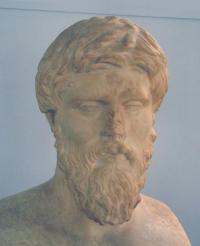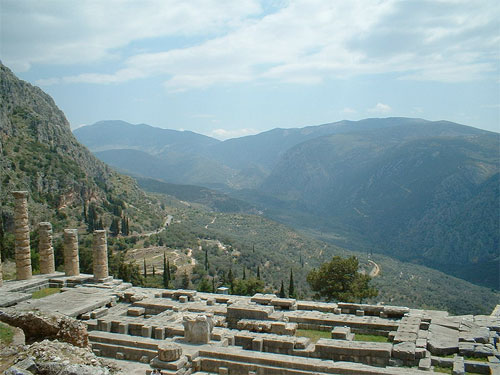Plutarch's Lives
 Plutarch at the Museum of Delphi, Greece.
Plutarch at the Museum of Delphi, Greece.
 Ruins of the temple of Apollo at Delphi, where Plutarch was a priest
Ruins of the temple of Apollo at Delphi, where Plutarch was a priest
Schedule:
Oct. 1-10: Pompey
Oct. 11- 20: Antony
Oct. 21-?: Cicero
Oct. ?: Coriolanus
?: Windup
Marcus Tullius Cicero
Bertel Thorvaldsen, copy of Roman original, ca 1800
Cicero denouncing Catiline (Cesare Maccari)
Questions for Cicero
1. What is the role of the Orator in Roman society? Is there anyone in British or US history comparable to Cicero and the role he played?
2. What were Cicero's ambitions? His strong and weak points? How did they help/hurt him?
3. Cicero is the first Roman we've read about who was not accomplished in battle. How did this hurt him? How did it help him? What is the relationship between the army and politics in Rome?
4. Cicero is best known for suppressing Catiline's revolt. How did he do that?
5. Cicero is criticized all his life for executing Catiline's fellow rebels without a trial. Yet later, Augustus Caesar calmly agrees to execute Cicero as part of a bargain for power. What is the difference?
6. Are we getting to know our guide, Plutarch any better? What does this section tell us about his character?
Clough Translation-Roshanarose's Link-----------------------------------------------------------------------------------------------------------------------------------------
They didn't know as much about the workings of the brain then. Perhaps that is Cicero's vanity talking.
GINNY: Thank you so much. I loved that excerpt. I especially liked it when he said that if he wasn't going to be immortal, he doesn't want to know. At least he doesn't have to fear that those who say there is no life after death will say "I told you so!" when they are dead.
It's interesting that, in spite of the awful view of life after death in the Oddysey, he has the same view of it that we do: he'll be able to see his old friends again. Some things change and some things don't!